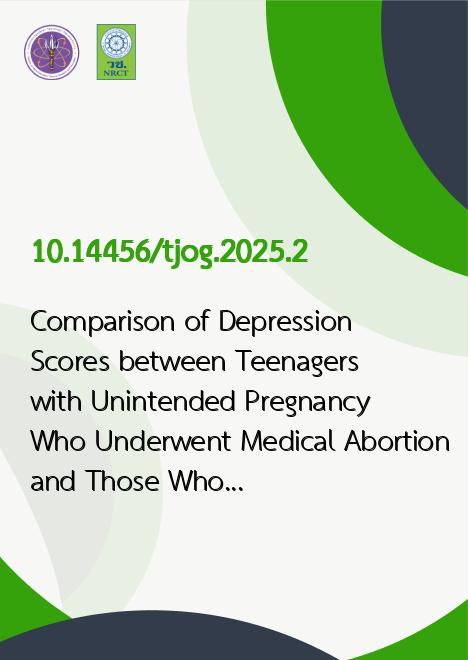
|
Comparison of Depression Scores between Teenagers with Unintended Pregnancy Who Underwent Medical Abortion and Those Who Underwent Delivery in Ramathibodi Hospital using the Thai Edinburgh Postnatal Depression Scale |
|---|---|
| รหัสดีโอไอ | |
| Creator | Man Thongaram |
| Title | Comparison of Depression Scores between Teenagers with Unintended Pregnancy Who Underwent Medical Abortion and Those Who Underwent Delivery in Ramathibodi Hospital using the Thai Edinburgh Postnatal Depression Scale |
| Contributor | Sunya Patrachai, Komkrit Aimjirakul, Apisith Saraluck, Chutima Roomruangwong, Orawee Chinthakanan |
| Publisher | PIMDEE Co., Ltd. |
| Publication Year | 2568 |
| Journal Title | Thai Journal of Obstetrics and Gynaecology |
| Journal Vol. | 33 |
| Journal No. | 1 |
| Page no. | 13-22 |
| Keyword | abortion, unintended pregnancy, teenage pregnancy, postpartum depression |
| URL Website | https://tci-thaijo.org/index.php/tjog/index |
| Website title | www.tci-thaijo.org |
| ISSN | 2673-0871 |
| Abstract | Objectives: The aim of this study was to compare teenagers with unintended pregnancy that terminated their pregnancy and those who delivered using the Thai Edinburgh Postnatal Depression Scale (EPDS) and determine predisposing factors for depression. Materials and Methods: This cross-sectional study was conducted at a tertiary hospital between September 2018 and July 2019. Only data for unintended teenage pregnancies that underwent medical abortion or delivery were included. Exclusion criteria were intended pregnancy, history of major deressive disorder diagnosis, and refusal to participate. All participants completed the EPDS within 2 weeks after termination or delivery. Results: In total, 131 teenage pregnancies were recorded over the study period. We excluded 10 intended pregnancies and one woman with history of major depressive disorder diagnosis. Sixty-five women underwent medical abortion (abortion group) and 55 underwent delivery (delivery group). Overall, there was no statistically significant difference in the total EPDS score between the two groups. There were 23 women (19.2%) with an EPDS score ? 11. The delivery group was more likely to have developed depression compared with the abortion group (25.4% vs 13.8%, risk ratio [RR] 0.87, 95% confidence interval [CI] 0.72-1.04). The delivery group was more likely to live with a partner than the abortion group (54.5% vs 9.2%, p < 0.01). Significant protective factors for postpartum depression were having family support (RR 2.26, 95%CI 1.16-3.27), continuing education (RR 1.27, 95%CI 1.07-1.51), and living with a partner (RR 1.20, 95%CI 1.03-1.41). Conclusion: More teenagers with unintended pregnancy who delivered had postpartum depression than those who terminated their pregnancy, although the difference was not statistically significant. No family support, dropout from school, and living alone were predisposing factors for depression. |
